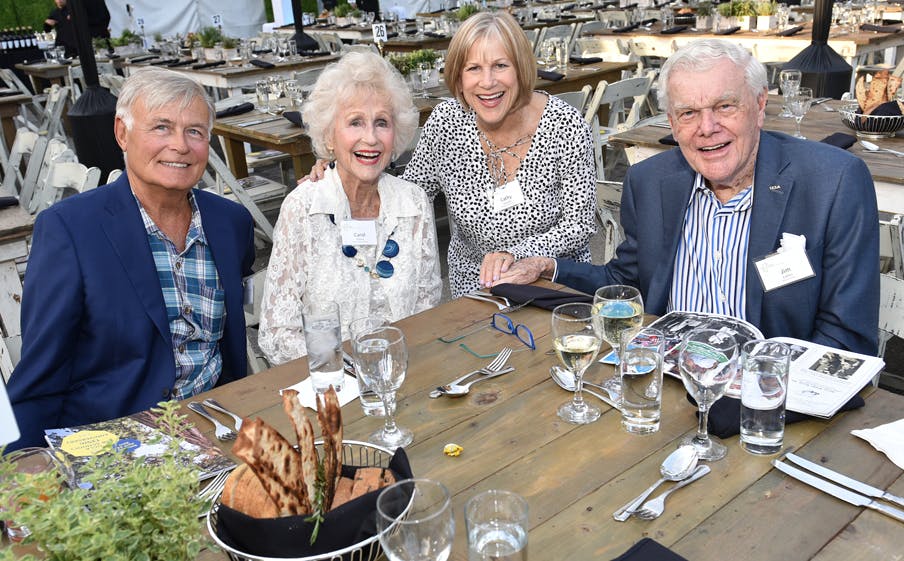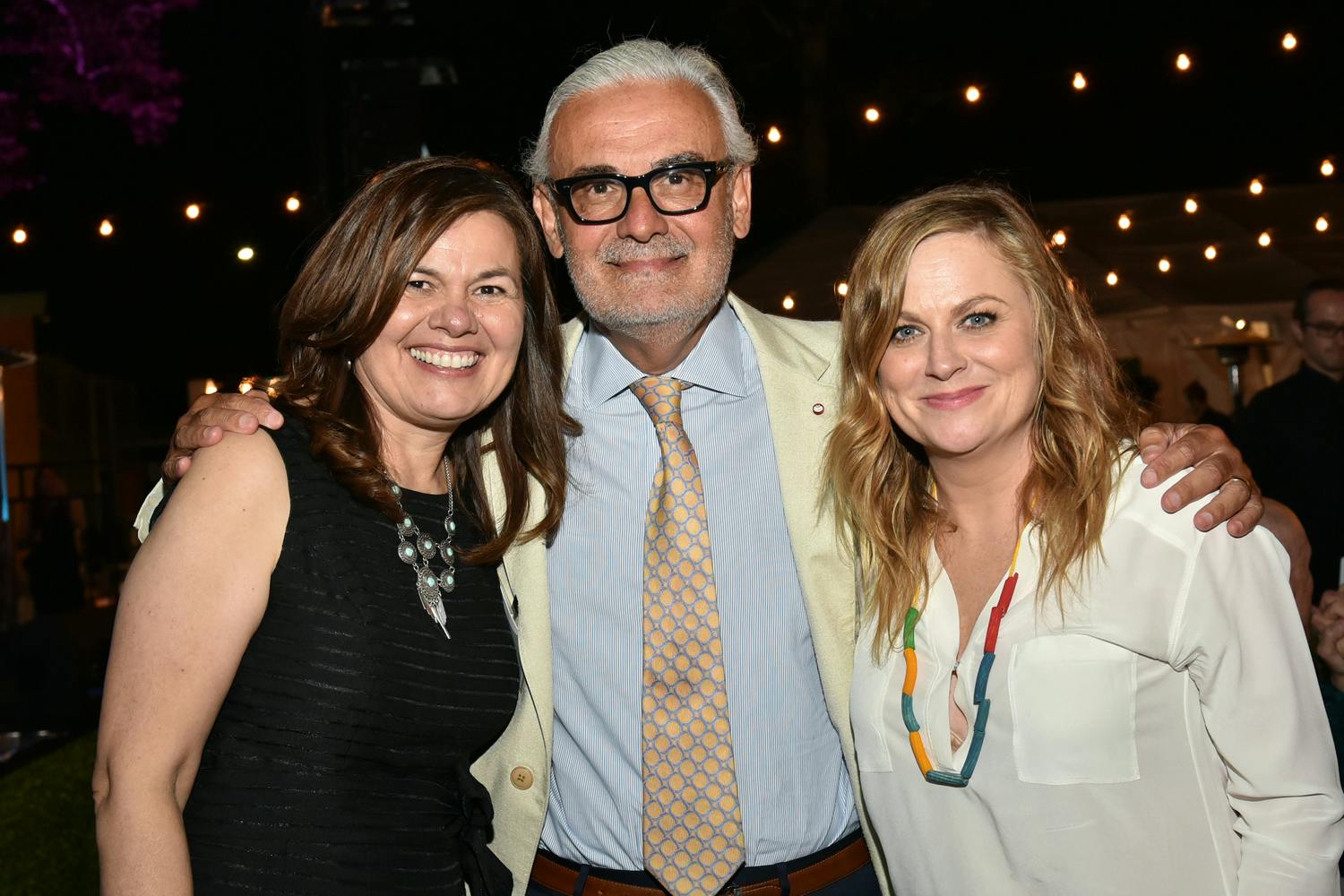The traditional blacktop playground at UCLA Lab School – which is just about the only feature that resembles a typical school on the historic California Modernist campus – was transformed into the scene of a rustic evening gala on April 22, courtesy of Wolfgang and Gelila Puck. The reason for celebration: the 135 anniversary of the innovative kindergarten and elementary school on the campus of UCLA. The event raised $350,000 for the UCLA Lab School Student Diversity Fund for scholarships.
The evening’s program included comedian, actor, writer, and producer Amy Poehler, who served as emcee and Tony-award winning singer, actor, and songwriter Idina Menzel, who donated their talents to the event. A performance by the UCLA Lab School children’s choir under the direction of music teacher Nick Kello, also graced the stage.
Silva, who is the Carol L. Collins Principal’s Chair at UCLA Lab School, greeted the audience of approximately 650 alumni, parents, faculty, staff, and friends, and thanked the school’s numerous supporters for their contributions.

“Each and every one of you has been [dedicated] to making our school an extraordinary learning community,” she said. “It has been such a joy to see so many familiar faces and to hear the amazing stories that you have from the Lab School, from way back as far as 1950. One hundred-and thirty-five years is an amazing milestone and we are delighted to have all of you here to celebrate the founding of UCLA Lab School in 1882.
“Today, which is fittingly Earth Day, we are actively planting seeds of innovation here in Los Angeles, across the nation, and across the world. I believe it is the right of every child to experience a democratic learning community; where their voice is respected and they gain the tools to be critical, discerning thinkers and engaged and well-informed citizens, as John Dewey wrote about a century ago. I am honored as principal to be part of a school whose mission it is to share this philosophy and pedagogy with educators around the globe [and] I invite you to support us in that endeavor.”
Dean Suárez-Orozco discussed the UCLA Lab School’s origins dating back to 1882 when the California State Normal School – the nucleus of UCLA as a University – was established on the current site of the Los Angeles Central Library until 1947 when it was relocated on the Westwood campus. He noted the global impact of UCLA Lab School on teacher education and preparation today.
“Educators from all over the world come to observe the classrooms and experiences at UCLA Lab School and to learn from our Lab School faculty,” he said. “The notion that we all have something to say and something to contribute is one of the interwoven themes of this evening’s historic celebration. Today, when the very idea of a liberal democracy is under siege, our efforts to create models for citizenship, for engagement, for excellence, for ethics, and equality are more important than ever before.”

Waugh, who is the parent of two UCLA Lab School (formerly UES) alums, said that the former UES has “high educational values, but offers more than a good education. The experience of attending the Lab School instills in students qualities and values such as a respect for the planet as well as respect for all individuals that transcend the classroom. Our community comes together to celebrate this incredible institution, its commitment to values as well as education, and the dedication of the alumni and many others who have made it effective and successful for so many years.”
Poehler, who has an Emmy and a Golden Globe among her accolades, greeted the audience in both Spanish and English, saluting the UCLA Lab School with her signature wit.
“We are here tonight to celebrate 135 years of this amazing school,” she said. “And it’s amazing that the Lab School is 135, but because it’s in Los Angeles, it insists that it’s only 129, but we all know. Either way, she looks great and everyone says she’s gotten great work done.”
The daughter of two public school teachers, Poehler noted that she knew “how important it was to love school early.”
“We never forget when a teacher tells us, ‘You’re good at math,’ or, ‘You’re an interesting writer,’” she said. “Truly, these are the moments in our children’s lives that burn into their brains – they don’t forget these moments.”
Poehler recognized the commitment of UCLA Lab School faculty, staff, and community, saying, “… really great people go here, really great people work here, and kindhearted people keep this place going.
“So think about these people tonight, as you go home from this event, warm with the generosity you’ve seen and open to the possibility of what your child can become. Peek into the room of your sleeping child, look into their beautiful face, and lean in very close and say, ‘You’d better grow up to be the mayor.’”
Mayor Garcetti, who attended UCLA Lab School when it was known as the Corinne A. Seeds University Elementary School (UES), was introduced by his former kindergarten teacher Karolynne Gee, herself a UCLA alumna (’56, B.A., Art).
“I was looking back over [Eric’s] cumulative record…and I found some interesting observations that we had made,” said Gee. “One comment was, ‘Eric has excellent ideas, is a stabilizing influence, and enriches the group with his contributions.’ I remember him as being an attentive listener, curious, and fun to have in a learning situation. He asked questions that frequently fell into the category of ‘What if?’ or ‘Why not?’ [that] helped to move conversations and thinking along… in unexpected and very exciting ways.
“This was at the age of six. And I think that it was a sign of leadership. So I’m not surprised that Eric has become so successful and is one of our school’s most distinguished alumni.”
Mayor Garcetti noted that visiting the UCLA Lab School was like “coming home.”

“I’ve been very blessed to have an amazing family… to be in a stable setting growing up, to have amazing friends, some of whom are my closest friends from my UES days, to have opportunities to study at other schools here, on the East Coast, and abroad,” he said. “And this to me, remains the most important educational experience of my life. Besides my family, it really made me who I am.
“UES did something so effectively that it is wonderful to see that spirit living on so many years later. It wasn’t about teaching us, or telling us. It was about showing us and letting us discover. It was about overcoming difficult moments, it was about learning about cultures but never telling us we were learning about something.”
Garcetti pointed out the great value of an education at UCLA Lab School today, which affords its students the opportunity to learn alongside other children from a diverse range of ethnic, religious, economic, and ability levels.
“When you plant that seed early as opposed to trying to teach it later when kids are in middle school, high school, and college, it’s something [where they’re] unlearning what they take to be normal, which isn’t,” he said. “But here, what we learned to be ‘normal’ much more closely reflects the world that we not only aspire to, but if we look with our eyes wide open, the way the world is today.
“At this moment, more urgently than ever, we have to show that and we have to teach it without our children knowing they’re being taught. Because what they see and what they hear are the lessons they’re growing up with. It might be difficult for us as adults to be in this period, where we’re more obsessed with the most powerful person in this country than remembering the most vulnerable amongst us, but they will take us back, remembering our work is there with the people who need us most, not the ones who shout at us the loudest.”
All photos by Todd Cheney, UCLA
